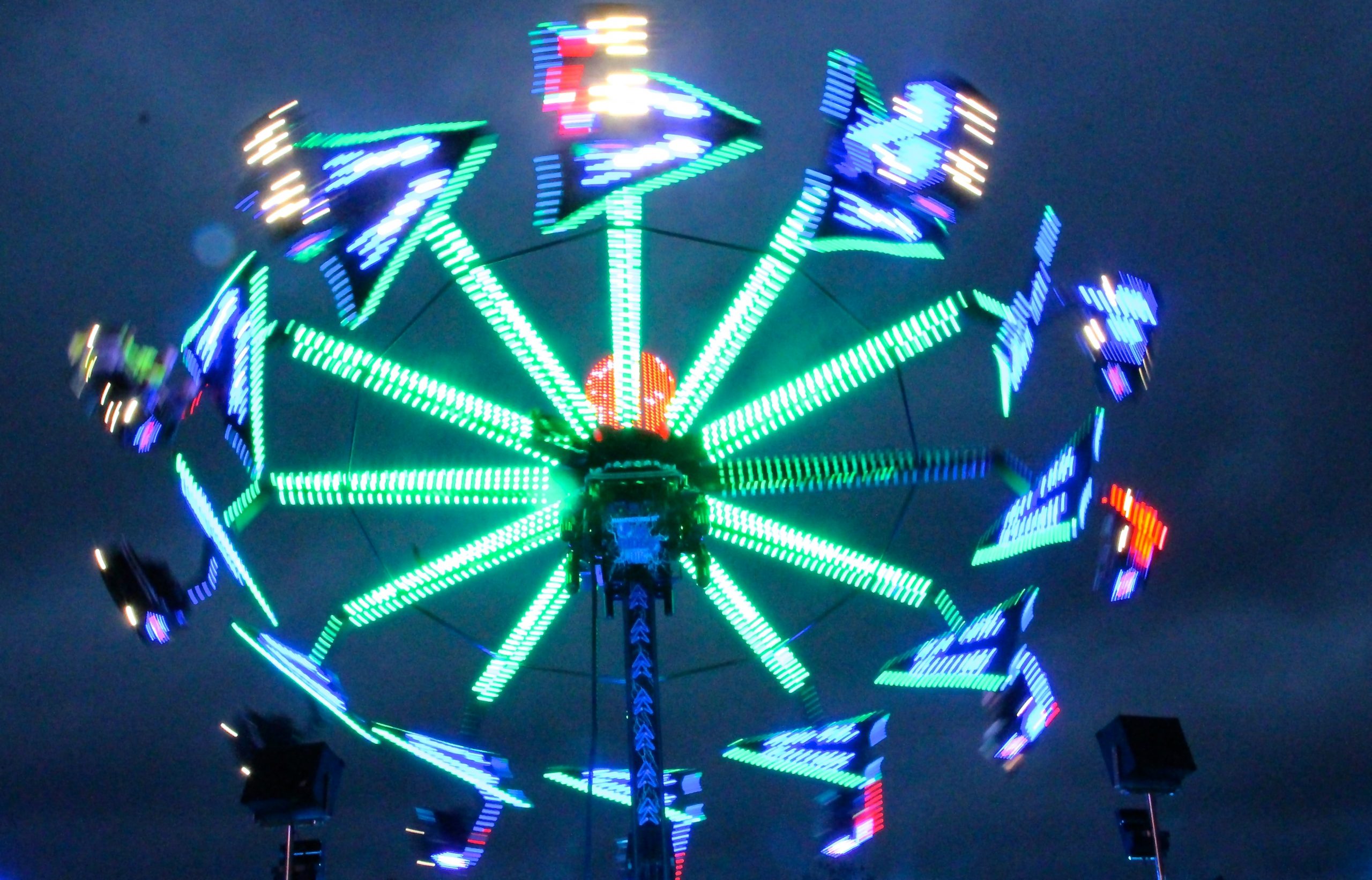There’s a temporary utopia in town. You can see the lights in the distance, flashing through the gaps in trees, across gardens and slate roofs. You can hear the music and the high pitched screams and the hiss of hydraulics through late summer air.
August, 2020. There’s a funfair on the Common. It is only a small one: a few socially distanced rides huddling well away from one another. But it is definitely there. Its placement has a defensive quality, tucked away at the bottom of the hill down by the High Road, surrounded by a temporary fence. It stops and starts, struggling for custom. Every time I walk past in the morning and at twilight I see the rides squatting emptily, waiting for punters, surrounded by bored men smoking and chatting.
In these viral times, in a lull in the pandemic, it is optimistic of them to come here and set up shop. In that sense, you might read it as a positive sign. A little flash of returning normality in the midst of a ‘new normal’ defined largely by weirdness. In another sense of course it presents a strange tangle of interconnecting risks. Danger of death from those poorly maintained rides meeting danger of death from infection carried on machinery and candy floss.
I want to walk out into that fair and take some pictures. I want to put my mask on and move in close enough to hear the screams.
A funfair is a portal that connects you to different times. The lights, the repetitive music, the conjuring trick worked by the shooting galleries and the ghost train; they trigger responses deep within you: emotions, memories. They allow you to slip through one reality and into another. The sights and sounds come together to create a spectacle, an illusion which, for some reason, never changes and always, always works.
Walking around a weirdly empty, Covid-stricken fairground on a bank holiday weekend, I can suddenly see how it all works. I can see the breaks and the joins and the gaps between things. Sitting on their rides, bored workers stared into the distance or dance ironically to the music pumping out of speakers. The music is never updated. It is the same music played at fairs for the past twenty years or more. Rave classics. ‘You’ve got to show me love’, ‘It’s Not Over Yet’, ‘Search for the Hero’. A few scattered families are wandering, wearing masks. Rides whirl and climb into the sky with only a couple of punters aboard. Hand sanitizers squirts are compulsory on embarking and disembarking.
In the looking glass hall of mirrors here I see reflections and refractions of funfairs past. I remember trips to Blackpool as a child. Every year with my grandparents to see the illuminations. The almost panicked excitement of it. The huge scale of the rides when seen from close to the ground. The sense of being inside another world in the dark rides: ‘River Caves’ and ‘Alice in Wonderland’. Experiencing actual, traumatising terror on the Ghost Train. The definite autumn darkness with weird light at the edges, the rich feel of seaside air, the luminous paint glowing and the smells and screams lingering in the car on the way back.
The filmmaker Patrick Keiller, who grew up in Blackpool, once suggested that: ‘if Louis Aragon had come to England and someone had taken him to Blackpool, he might have been intrigued, and England wouldn’t have been left off the Surrealist map of the world’.
Wandering through this tiny funfair in South London, stopping to take pictures and jot down notes, I can see exactly what he meant.
Funfairs are portals, ways back to different times.
I remember going to Blackpool again later, as an adult (or a young adult, a larger child). The excitement felt almost as intense. It felt almost…better. I was there with someone that I loved at the time, intoxicated, happy just to take a day out from the world and immerse myself in a different, artificial one that has stood somehow on the cold lip of the North Sea for more than a hundred years.
When I was there, I didn’t think about the future at all. I didn’t realise that this was a moment that would have an ending. I didn’t realise that the person I was with would become a stranger one-day. I didn’t realise it would turn all turn into nostalgia.
Fairgrounds, pleasure beaches, funfairs. Trips away with different people over different years. Grandparents, parents, partners who come and go. Different versions of myself, on different rides, with different people.
And then, finally, just me. Just me, walking around a deserted South London funfair with a camera, in the middle of a pandemic, alone.
Michael Eades is a writer, researcher and curator based in London. His work has appeared in The Mechanic’s Institute Review, The i, and Reflex Press. Michael also runs the UK’s Being Human festival, an annual multi-city festival of innovative, research driven events. He can be found at @DrMichaelEades and www.michaeleades.net.
